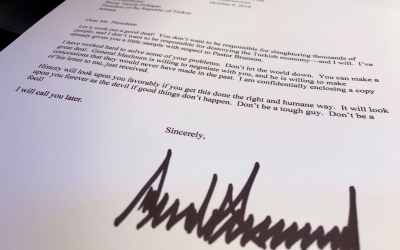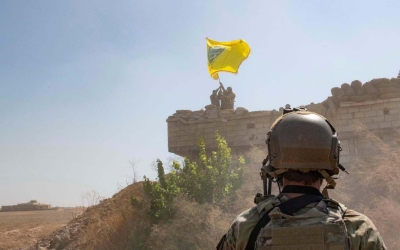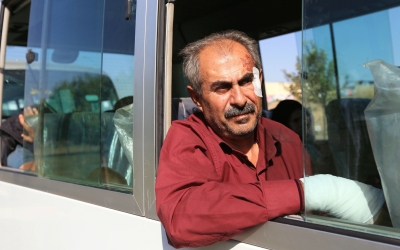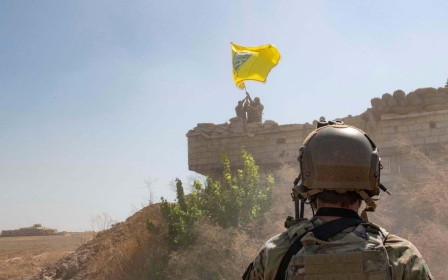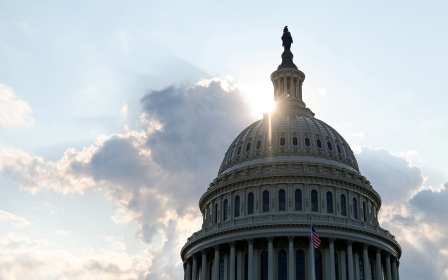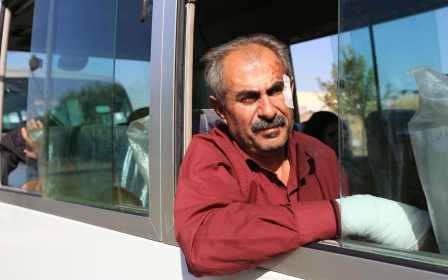Syria Kurds call for humanitarian corridor to evacuate 'dead and wounded' civilians
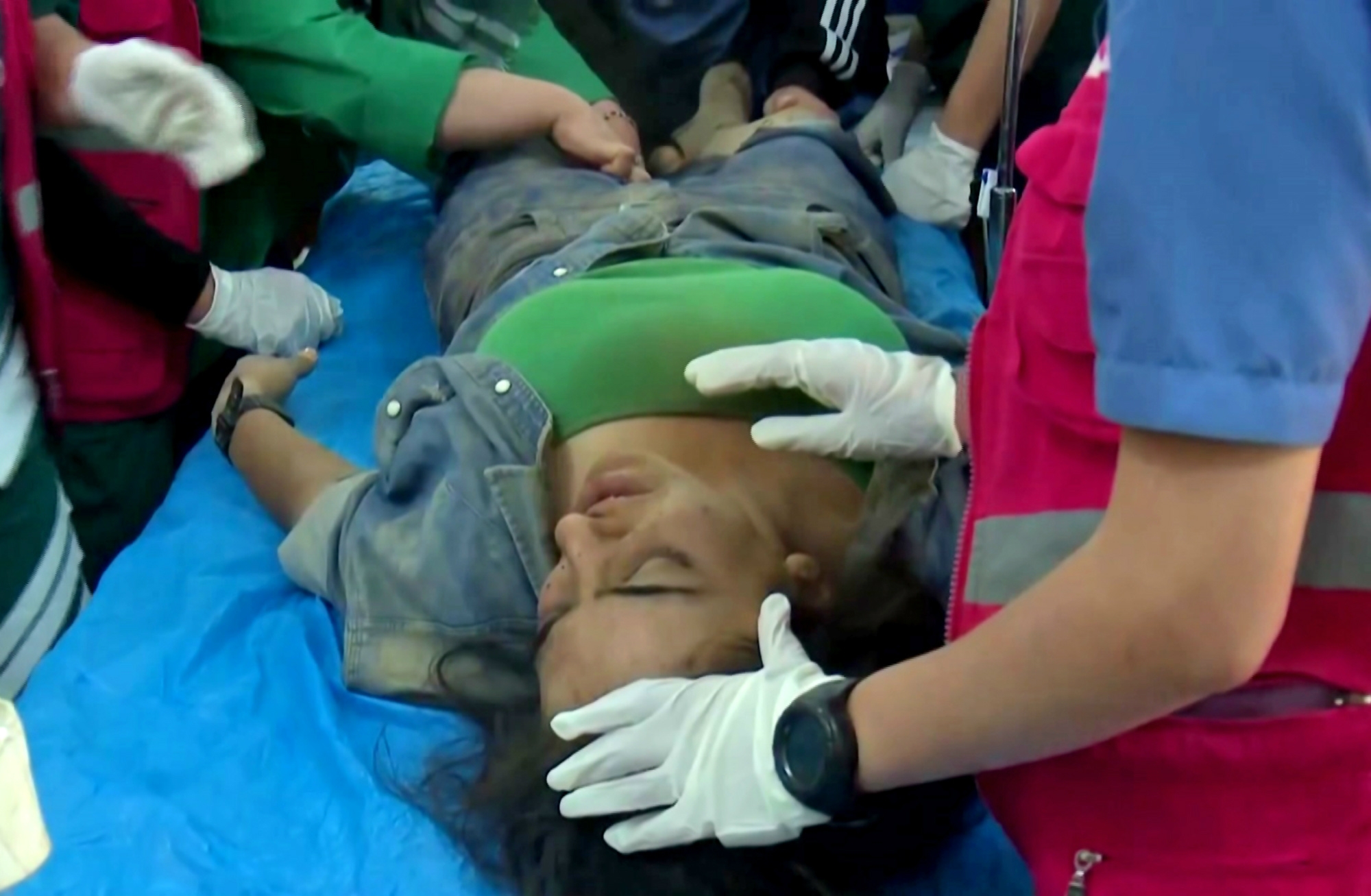
Kurdish authorities in northeastern Syria have called for a humanitarian corridor "to evacuate dead and wounded civilians" from a flashpoint border town encircled by Ankara's forces, as Turkey's offensive enters its ninth day.
It said in a statement that people were trapped in Ras al-Ain, urging foreign powers including the US-led coalition and Russia, to intervene to get them out.
Thursday's appeal comes after Turkey's Syrian proxies hit a health facility in the town, trapping patients and staff inside, according to a UK-based activist group.
"There have been intensive air strikes on Ras al-Ain over the past three days," Rami Abdel Rahman, the head of the Syrian Observatory for Human Rights, said.
Turkish forces and the mostly Arab and Turkmen former rebels they use as a ground force had "taken about half of the town" by Thursday morning, he added.
Massively outgunned by the Turkish army and its airforce, Kurdish fighters from the Syrian Democratic Forces (SDF) quickly lost a long stretch of border when the assault was launched on 9 October.
They organised a defence of Ras al-Ain however with a dense network of tunnels, berms and trenches that held off Turkish forces and their proxies for about a week.
An AFP correspondent on the Turkish side of the Ras al-Ain frontline said the sound of gunfire and blasts from artillery and air strikes was constant.
Russian promise
Turkey wants to create a 30km-deep buffer on the Syrian side of the border to keep Kurdish militias at bay and set up a "safe zone" for some of the 3.6 million Syrian refugees living on its soil.
Russia has promised Ankara that the People's Protection Units (YPG), the primary component of the SDF which Turkey's military is targeting, will not be in the Syrian territories across the border, Turkish Foreign Minister Mevlut Cavusoglu was quoted as saying on Thursday.
Moscow "promised that the PKK or YPG will not be on the other side of the border," Cavusoglu said in an interview with the BBC.
"If Russia, accompanied by the Syrian army, removes YPG elements from the region, we will not oppose this."
Earlier on Thursday, Russia's foreign ministry spokesperson said Syria should get control over its border with Turkey as part of any settlement of the conflict in the region, as Turkey pressed on with its offensive.
Syrian President Bashar al-Assad said on Thursday his forces would counter Turkey's invasion by "all legitimate means," in his first remarks since deploying troops near the border to support the SDF.
We "will respond to it and confront it, in all its forms, anywhere in Syria, using all legitimate means at our disposal," Assad told Iraqi national security adviser Faleh al-Fayad.
Kurds say hundreds of civilians killed
Turkish President Recep Tayyip Erdogan has so far ignored international pressure to halt the offensive, which has displaced more than 300,000 people, according to the Observatory.
'Germany will not deliver any weapons to Turkey under the current conditions'
- German Chancellor Angela Merkel
Abdel Rahman said the jump in the number of people forced to flee was due to a fresh wave of displacement over the past few days from areas around Tal Abyad and Kobane and in the Hasakah province.
Most displaced people tried to move in with relatives in safer areas, some were sleeping rough in orchards and others in some of the 40 schools that have been turned into emergency shelters, he added.
The Kurdish-led administration in the region said on Thursday that the Turkish offensive had killed 218 civilians, including 18 children, since it began.
The fighting has also wounded more than 650 people, the statement from its health authority said.
Turkey accused of using banned weapons
On Thursday, Kurdish authorities accused Turkey of resorting to banned weapons such as napalm and white phosphorus munitions.
"The Turkish aggression is using all available weapons against Ras al-Ain," the Kurdish statement said.
"Faced with the obvious failure of his plan, Erdogan is resorting to weapons that are globally banned such as phosphorus and napalm," the statement added.
Turkish Defence Minister Hulusi Akar said on Thursday that Turkey's military does not have chemical weapons among its arsenal.
"There is information that the terror group will use chemicals and then blame us for it," he said.
The Observatory, which has a wide network of sources on the ground, could not confirm the use of napalm or white phosphorus.
But Abdel Rahman said there had been a spike in burn wounds over the past two days, mostly casualties brought in from the Ras al-Ain area.
Kurdish officials posted a video on social media showing children with burns, which one doctor in Hasakah province saying the wounds are consistent with the use of banned weapons, AFP reported.
White phosphorus can be used to create a smokescreen or as a battlefield marker, but it can also be deployed as a deadly incendiary weapon, a use prohibited under international law.
"We urge international organisations to send their teams to investigate some wounds sustained in attacks," SDF spokesman Mustafa Bali said on social media.
"The medical facilities in northeast Syria lack expert teams," he added.
Pence visit
US Vice President Mike Pence will reportedly urge Turkey on Thursday to halt its offensive, a day after US President Donald Trump threatened further sanctions over the operation.
Pence began talks with Erdogan in Ankara on Thursday, with US Secretary of State Mike Pompeo and other officials also expected to hold talks with their counterparts.
A top aide to Erdogan, Ibrahim Kalin, met National Security Adviser Robert O'Brien on Wednesday and said he had conveyed Turkey's position.
On Wednesday, Trump said he thought Pence and Erdogan would have a "successful meeting", but warned of sanctions and tariffs that "will be devastating to Turkey's economy" otherwise.
Kalin said that Turkey's foreign ministry was preparing to retaliate against the US sanctions.
Trump's critics say the US sanctions so far, including a hike to steel tariffs, a pause in trade talks, and sanctions on the defence and energy ministries, were too soft.
Erdogan has dismissed the sanctions and rejected a global chorus of calls to halt the offensive.
Erdogan said Turkey would end its operation when Kurdish forces withdraw from the "safe zone," adding that "no power" can deter Ankara's operation until it reaches its goals.
German Chancellor Angela Merkel said on Thursday that Berlin would not deliver any weapons to Turkey under current circumstances and added that she had urged Erdogan several times to end its military operation in northern Syria.
"In recent days I have strongly urged Turkey... to end its military operation against the Kurdish military and I'm stressing that again now," Merkel told Germany's lower house of parliament.
"It's a humanitarian drama with huge geopolitical effects so Germany will not deliver any weapons to Turkey under the current conditions," she added.
Middle East Eye propose une couverture et une analyse indépendantes et incomparables du Moyen-Orient, de l’Afrique du Nord et d’autres régions du monde. Pour en savoir plus sur la reprise de ce contenu et les frais qui s’appliquent, veuillez remplir ce formulaire [en anglais]. Pour en savoir plus sur MEE, cliquez ici [en anglais].


